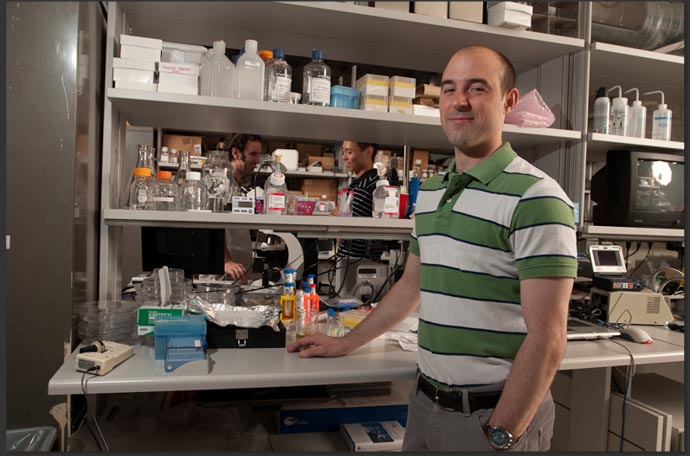 We at Lab on a Chip are very pleased to announce our newest Editorial Board member – Professor Aaron Wheeler. Professor Wheeler is the Director of the Wheeler Microfluidics Laboratory at the University of Toronto. Below, he explains how he got into microfluidics, the challenges facing the field, and why he’s trying to be a hockey fan…
We at Lab on a Chip are very pleased to announce our newest Editorial Board member – Professor Aaron Wheeler. Professor Wheeler is the Director of the Wheeler Microfluidics Laboratory at the University of Toronto. Below, he explains how he got into microfluidics, the challenges facing the field, and why he’s trying to be a hockey fan…
1. Please tell us a little about your research background.
I did my Ph.D. in chemistry working with Richard “Dick” Zare at Stanford University. I planned to work on projects related to capillary electrophoresis, but shortly after I started, Dick introduced me to a postdoc who was working in the “new” area of microfluidics. A few trips to the cleanroom later, I was hooked, and spent my time at Stanford developing microfluidic methods to analyze the contents of single cells. After completing my Ph.D., I went to work as a postdoc with Robin Garrell at UCLA, where I learned about the technique known popularly as “digital microfluidics” or “electrowetting-on-dielectric (EWOD)”. Robin introduced me to Chang-Jin “CJ” Kim and Joe Loo, and I spent two years having a blast bouncing between those three labs, developing interfaces between microfluidics and mass spectrometry. (Note to students – do a postdoc! This is the most fun you can have as a scientist.) I then began my career as an assistant professor at the University of Toronto, and now I spend most of my time hiding from my colleagues so that I can talk with my students about the fun they are having in the lab.
2. What first got you interested in lab on a chip technology as a research area?
As mentioned previously, a postdoc in my Ph.D. lab, Keisuke Morishima (now a professor at Osaka University), introduced me to microfluidics. The rest, as they say, is history.
3. What do you think the most significant advance in LOC technology has been in the last 5 years?
It is difficult to choose – there have been so many exciting advances. One that sticks out is the method developed by Mehmet Toner and colleagues for extracting rare cells from heterogeneous suspensions. When I speak with scientists outside of the lab-on-a-chip community, this is the topic that comes up most often.
4. What do you think is the biggest challenge facing lab on a chip researchers at the moment?
Our field continues to struggle with the translation of new technologies out of the labs of “microfluidics experts” and into the hands of the end-users.
5. What advice would you give to young researchers just starting their careers?
Be opportunistic! Academic scientists are required to write very detailed predictions of the future (i.e., grants). Good grantsmanship is of course an important skill, but I encourage young researchers to not be fooled into thinking that the science will follow the script! Initial hypotheses are often wrong (or the experiments to explore them turn out to be dull), but interesting phenomena can be found everywhere. Keep your eyes open and be ready to explore new and unexpected observations.
6. If you weren’t a scientist, what would you be doing?
Hmm. I think I would try to be a part of the US National Public Radio show, RadioLab. If you are not a listener, check it out. I am a huge fan.
7. If you could meet anyone from history, who would it be and why?
Difficult question. I think I will go with Charles Darwin. (True story: I once was thrown out of Westminster Abbey by a large priest with a deep, booming voice for trying to make a charcoal rubbing of Darwin’s gravestone.) Darwin was obviously a source of important, transformative ideas, but he was interested in problems big and small. Apparently, he had a great passion for earthworms (!), going as far as to evaluate their behaviour over several decades by sprinkling markers on the ground to measure worm-driven soil turnover rates. I imagine that with some coaxing, a conversation with Mr. Darwin would cover almost any topic under the sun (or under the soil, as the case may be).
8. What’s your favourite sports team?
I grew up in the state of North Carolina, where college basketball is almost a religion. (True story: one day in sixth grade, televisions on media carts were rolled into all of the classrooms, and we spent the day watching the NCAA college basketball tournament instead of learning about fractions or whatever we were supposed to be doing.) So, I was (and am) a fan of the University of North Carolina (UNC) – in my formative years, that team featured Michael Jordan. (Perhaps you have heard of him?) Since coming to Canada, I have tried to become a hockey fan. I would like to be a fan of the Toronto Maple Leafs… but it is much easier to be a fan if your team actually wins some games.
We welcome Professor Wheeler’s expertise to the Board, and look forward to working with him over the coming months.
Professor Wheeler’s recent Lab on a Chip papers include:
Virtual microwells for digital microfluidic reagent dispensing and cell culture
Irwin A. Eydelnant, Uvaraj Uddayasankar, Bingyu ‘Betty’ Li, Meng Wen Liao and Aaron R. Wheeler
Lab Chip, 2012,12, 750-757
DOI: 10.1039/C2LC21004E
A digital microfluidic method for multiplexed cell-based apoptosis assays
Dario Bogojevic, M. Dean Chamberlain, Irena Barbulovic-Nad and Aaron R. Wheeler
Lab Chip, 2012,12, 627-634
DOI: 10.1039/C2LC20893H
A digital microfluidic method for dried blood spot analysis
Mais J. Jebrail, Hao Yang, Jared M. Mudrik, Nelson M. Lafrenière, Christine McRoberts, Osama Y. Al-Dirbashi, Lawrence Fisher, Pranesh Chakraborty and Aaron R. Wheeler
Lab Chip, 2011,11, 3218-3224
DOI: 10.1039/C1LC20524B










